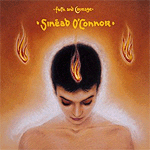 |
 |
|
|
|
| |||
 Sinéad O'Connor
Sinéad O'ConnorFaith and Courage [Atlantic] Rating: 3.8 I'm going to leave the Tibet situation in the capable hands of Perry Farrell and a couple of Beastie Boys, and dedicate this record review to those in Uzbekistan practicing the teachings of Sun Myung Moon. Yes, these 843 words mark my commitment to the Unification Church's struggle for Religious Freedom in the former Soviet Territories. Excuse my ridiculous gesture; it was inspired by the liner notes of Sinéad O'Connor's Faith and Courage, which state: "Glory be to the Father and to the Son and to the Holy Spirit as it was in the Beginning. Is now and ever shall be. World without end. Jah! Rastafari! Read I! This record is dedicated to all Rastafari people..." From Michael Stipe's sporting of a different politically correct t-shirt each time he took the stage to accept another award for "Losing My Religion" to Sting watering the rainforest with song, pop icons who self-righteously espouse over-simplified global politics bug me. I wasn't sure who "the real enemy" was-- and I don't know if Sinéad did, either-- when she thrilled the MTV newsdesk by tearing up a photograph of Pope John Paul II, shouting "Fight the real enemy," after her Saturday Night Live a capella performance of "War." But a decade later, the Roman-Catholic-lesbian-priestess seems as confused as ever. While Faith and Courage is not as obviously embarrassing as Perry Farrell muttering, "Like, torture is, like, crazy, man! Like, mothers are being, like, tortured!" over the airwaves of the K-Rock-sponsored "Radio Free Tibet" broadcast, the album begins with the line "I have a universe inside me," ends with "Christ have mercy," and somewhere in the middle, proclaims, "I feel real cool and I feel real good/ Got my hair shaved off and black thigh boots.../ And I feel real hot when my makeup's nice." While many adolescents go through mixed-up times, most have the sense not to let Wyclef Jean remix their accounts of first love into a four-minute bowl of mush called "Dancing Lessons." And sure, many teens fight the power of standard English by using replacements like "U" for "you," but they most likely didn't get the idea after cashing in on a Prince song. Most teens smash old hard-drives and burn their diaries in modesty and 20/20 hindsight; this diary is sold for $15 a pop to budding Earthmothers who quietly lurk in American suburbs, not quite fulfilled by Sarah McLachlan's last effort but not quite ready for Juvenile. Sinéad O'Connor is 33. The music is completely unremarkable, so let's discuss the lyrics. The opening track, "The Healing Room," is the lyrical witness to a spectacular biological feat: "I have a healing room inside me/ The loving healers there, they feed me." I remember when I first heard Whitney Houston sing about having the "greatest love of all" inside of her, thinking it sounded like a tumor. But that was the '80s-- it's a new millennium now, and Sinéad, in an attempt to be part of the solution, is womb to an entire hospital. The second song is titled "No Man's Woman." It's not like anyone thought she was a "man's woman" before. This song is similar to fellow countrywoman Paula Cole's work, only without the hilarious horsey antics, "Yippy-eye, Yippy-yo!" Those could have added a lot. "Daddy I'm Fine" is based on the premise that "fine" equals wanting to "Stand up tall with my boobs upright" while delivering a yearning whine that unconvincingly tries to be Neil Young, in a rhythm unfortunately similar to R.E.M.'s "It's the End of the World as We Know It." "The Lamb's Book of Life" states: "If we listen to the Rasta man/ He can show us how it can be done." Yes, Sinéad really says "listen to the Rasta man." I can't imagine you'd need to know anything else about this track. Meanwhile, "Emma's Song" serves as the ultimate new-age cliché, involving goddesses, lovemaking, birthgiving, apologizing, Brian Eno's piano and production work, and more mentions of the healing room. Faith and Courage closes with the traditional "Kyrie Eleison," but it's "radicalized" with layers of spoken word by Ghetto Priest, Junior Delgado, and Bonjo I. The music which accompanies it is Sinéad's standard fare of '80s torch balladry updated with some canned slow-jam beats courtesy of R&B; producer Kevin "She'kspere" Briggs, and feathery symphonies of "ooh-ahhs" courtesy of market pressure and Lilith Fair influences. The cover art features pastels, contemplation, a trinity of little fires and a glowing portrait of Sinéad. Remember how the aliens in the movie Cocoon glowed before they peeled off their skin at that geriatric bath house? That was cool. Sinéad's glow here warns of an inevitable Brian Dennehy-esque skin-peeling, and when it happens, she'll be putting her hand on the pulse of the Rasta man and transferring her life to him in a golden neon glow. All this faith, and courage for you, Rastafari people.
|
|||

